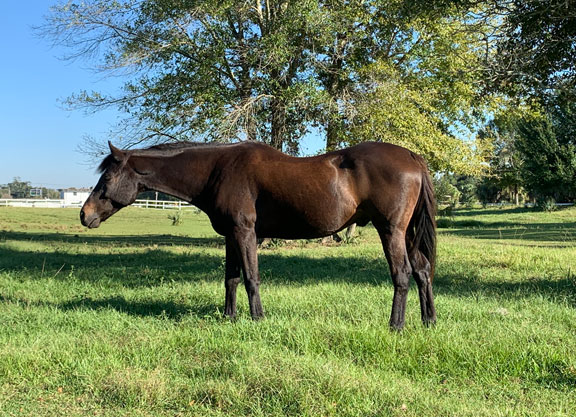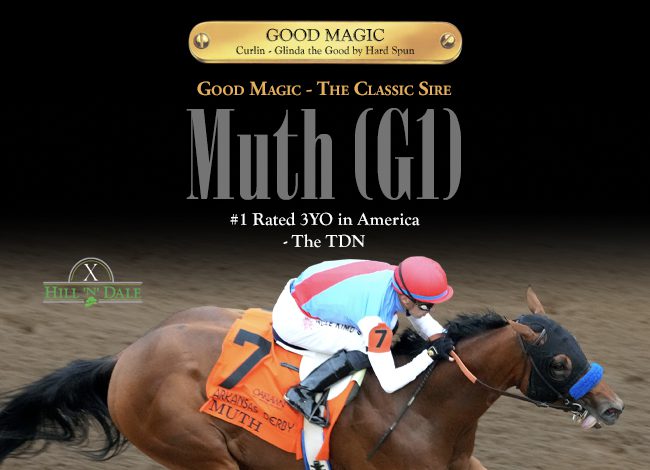By Diana Pikulski
None of the four off-track Thoroughbreds at Freedom Ride, Inc. in Orlando, FL, have exciting race records. The richest horse is Mr. Ellie (Colonel John) with lifetime earnings of $49,000. The other three, Billy's Holiday, NLU Brazen Walk, and Brandon Iron, have combined earnings of $14,500. In their second careers however, these four horses are invaluable. If ever the case could be made that off-track Thoroughbreds have a unique ability as therapy horses because of their intelligence, sensitivity and connection to humans, it is at Freedom Ride.
Freedom Ride is a model equine program in many respects. We arrived on a busy Tuesday afternoon and within minutes of being on the grounds you see the competence of the staff and volunteers, and feel the positive energy and pride of everyone involved in this highly evolved and tightly run equine therapy program. The organization has achieved the perfect balance of passion for horses and healing people, with professionalism and good business structure.
“Freedom Ride, Inc. was founded in 1998 with one horse to provide therapeutic horseback riding to people with disabilities,” said Marianne Gray, Executive Director of Freedom Ride. “The therapeutic riding program serves people down syndrome, autism, cerebral palsy. Horses can help all of those things with their beautiful strength and give a boost to confidence and a sense of accomplishment.”
“All of our instructors are PATH certified,” said Karen Boebinger, Head Instructor & PATH Certified Equine Specialist at Freedom Ride. “PATH is the Professional Association of Therapeutic Horseback riding. It is a national organization and Freedom Ride is a Premiere Accredited PATH Organization, which means that all of our instructors and equine specialists have to be certified and we get audited by PATH every five years.”
Boebinger herself has a lifetime of experience in riding, showing and owning horses. She started off at Freedom Ride ten years ago as a volunteer and dedicated her life to equine therapy. The pinnacle in therapeutic riding is PATH certification so naturally, that is where she set her sights.
“Being a premiere accredited center, all of our programs have to fall under strict PATH guidelines,” said Boebinger. “We serve people with severe physical and developmental disabilities in our therapeutic horseback riding program and we have a big and growing mental health program. Our current clients range from age four to 76.”
“Currently, we have about 30 veterans with PTSD who come once a week and they strictly do groundwork with the horses,” said Boebinger. “In our mental health program, we serve a large group of young people who are struggling in school, or struggling with grief, or social issues at home. About 12 of those clients do come once a week and then we have adults that are working on depression, anxiety, fear, any of the social anxiety issues or just mental health awareness in general.”
“Our mental health and veterans' programs are the most recent additions,” said Gray. “We have a big veteran population here in central Florida, so we looked into that and we've received a couple of grants to provide groundwork with the horses for the veterans so they don't have any cost at all, so we're thrilled with that.”
In many therapeutic programs, off-track Thoroughbreds are still not seen as the obvious first choice. When given the chance and the right training, they prove themselves. Across the service menu at Freedom Ride, the Thoroughbreds are the go-to horses.
“We wanted to help the many Thoroughbreds that are in the area and need homes,” said Boebinger. “Growing up, I showed Thoroughbreds so I knew that they were smart and could learn anything. We took a chance with Rusty and Noah and now we have four Thoroughbreds and they are the most adaptable.”
“It helps that they are extremely athletic. They are able to increase and decrease their pace easily at a walk and a trot, which gives our riders a little bit more movement. Not only do they excel in therapeutic riding, they make the most playful and interesting partners for veterans or anyone doing ground work.”
“Four out of our 13 therapy horses are Thoroughbreds and I have to admit they're the best,” said Gray. “One of them is only about six years old. We were hesitant about taking him in and it turns out he is just phenomenal. He's a big guy. He can carry some weight. These racehorses are helping a lot of families. They are giving some really challenged people a better quality of life.”
The training process is rigorous and the horses have to demonstrate an understanding of their place in a delicate partnership where safety is the first priority.
“We start by doing groundwork and natural horsemanship with them,” said Boebinger. “We want to see how willing they are and how they fit into the routine of life at our facility. Once we get through those things and they've settled in, after two or three weeks, we start doing the real work in the arenas with toys, and games, and rings, and tarps.”
The horses are tested for their tolerance of unusual things like if they will stand when the plastic tarp is tossed over their head. When someone throws a rubber ball and accidentally hits them in the head, are they going to be able to stand there and handle it? They are also required to be calm when someone is sitting on them and clapping and yelling and screaming, which might mimic the behavior of an autistic child.
“Once we know they can handle those behaviors, we will actually start working them in mock classes with volunteers doing side-walking and pretending that they're holding a rider up,” said Boebinger. “We have to see how they manage a rider who is very unbalanced and how long will they stand quietly in the mounting ramp. They have to be willing partners.”
For Boebinger, it's usually about a 90-day assessment period.
“If we deem the horse appropriate after 90 days, we will still take another month or two before we put him or her in the program full-time,” said Boebinger. “They are individuals and some take a little bit longer than others. Billy's Holiday for instance, is pretty young so we've given him a little more time. He has been here 8 months and he is just now going full-time into the program. Sometimes it can take up to a year for a horse to really, finally settle in and take a deep breath and go, 'Oh my gosh, I am a therapy horse and this is my job.'”
Freedom Ride's students and horses are frequent competitors in Special Olympics as well as in local shows and events. Brandon Iron, aka Rusty, who is ridden every week by Mary Grace will be her mount for the upcoming Holiday Horse Show at Freedom Ride and in the Special Olympics.
“Mary Grace came to us a few years ago and she was very unbalanced and had a difficult time in the mounting ramp getting on the horse,” said Boebinger. “She had competed in Special Olympics before with another farm and had a fall. Now, she is able to get on the horse with slight assistance from the instructor and she is much more balanced in the saddle.”
“Mary Grace has been riding Rusty for two years now will be competing independently at the walk. Rusty is her horse.”
Freedom Ride's unique location, in densely populated Orlando, and its' strategic partnerships with local schools, court systems, public health organizations, and veterans' associations are exposing new populations and key influencers to the unique benefits of equine therapy and the adaptability of Thoroughbreds. The facility is currently located in a section of an Orlando City park but that is about to change because the city wants to expand its ball fields and take over the land currently leased to Freedom Ride. The city offered them a less desirable location which the group felt was too close to the main road.
“What the city offered us was not ideal and we just knew that if we persevered, a better opportunity would come,” said Gray.
In the nick of time, it did. Freedom Ride found the ideal farm just 2.4 miles from their current facility and they are six months into an official capital campaign where all of the group's good will in the community is paying off. When they reach their goal, not only will they have more pasture and a new barn at their new farm, they will also have an indoor arena giving their current clients, and many more, year-round services.
The morning of our visit, Freedom Ride received a $350,000 check from AdventHealth Orlando, part of an independent health care system based in Florida, to sponsor the covered arena in their location. At the launch of the campaign, the barn was sponsored by a private individual for $300,000 so they are well on their way to success.
“We desperately need the covered arena so we are thrilled that it is sponsored,” said Gray. “AdventHealth became very interested in the success of our mental health program and they believe in what we do, so we approached them about the arena and they thought it a great partnership. We still have lots of items to get sponsored but these gifts really put wings under our campaign.”
For more information about Freedom Ride, Inc. go to www.freedomride.com, email Liz Lepore at [email protected], or call 407-293-0411.
Diana Pikulski is a partner at www.yepsenandpikulsi.com and editor of the Thoroughbred Adoption Network.
Not a subscriber? Click here to sign up for the daily PDF or alerts.






